What does open adoption mean for adopting parents entering into one? Here are two keys to help you create healthy open adoption relationships.
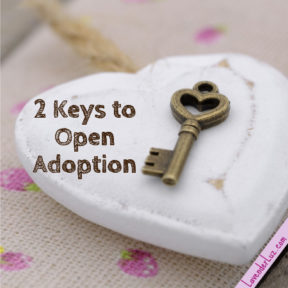
1. Open Adoption Means Healthy Boundaries
Discernment is a key to having healthy boundaries in any relationship. It’s just as misguided to have overly restrictive boundaries as it is to have no boundaries at all. The Great Wall of China and a barbed wire fence are not very discerning. They say “We’re gonna keep our things on our side and your things on your side.”
Consider what healthy boundaries look like with someone who is important to your family. You might have a guiding policy about, say, what beloved Uncle Billy is and isn’t allowed to give your daughter for her birthday (no toy guns, for example). And if Uncle Billy goes against your policy, how will you handle it? Cut him out of your lives?
When there is no adoption charge in a relationship, it’s easier to develop a functional filter, a way to let in the benefits to the child and keep out factors that are unsafe or unwise, the way a screen door lets in a breeze but keeps out mosquitoes. (No, I am not equating first parents with mosquitoes, but rather with behaviors that need to be negotiated by any two people in an ongoing relationship.)
With this and other boundary crossings, you would probably work to find ways to keep the relationship yet change the behavior.
Border Patrol
In short, you would probably try to set and patrol your boundaries less like this…

…and more like this.

At each decision point about contact, be mindful of what issues you yourself may be dealing with. Some common ones in adoption (open or otherwise) are:
- insecurity about not being the only mom or dad
- fear of losing the child to the birth parents one day
- jealousy of the unique connection the child has with birth parents
Identify and resolve your own emotional landmines so that your child doesn’t have to navigate yours on top of her own. Discern between actual safety/security issues that may affect your child, and issues that are more your own.
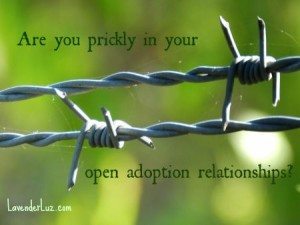 With discernment, you can choose your words and action in a way that best serves, rather than react from your unhealed places. (We all have those, by the way.)
With discernment, you can choose your words and action in a way that best serves, rather than react from your unhealed places. (We all have those, by the way.)
2. Open Adoption Means There Are No Supplicants
It’s not in anyone’s best interest to turn their child’s birth parents into supplicants (Oh, please mighty adoptive parent, will you send a picture? Or I’m begging you. Could we please arrange a visit?).
Rather, it IS in your best interest to have an ongoing respect for the people who brought your child into existence — even if you think they don’t quite deserve your respect. They did what you didn’t/couldn’t do, and you do what they couldn’t do. There is an evenness in this viewpoint.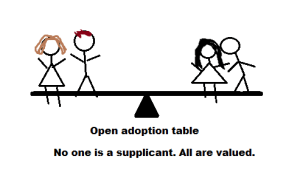 In a well-functioning relationship there’s a balance of worth, a recognition of inherent value not for what the first parents do (or don’t do) but for who they are.
In a well-functioning relationship there’s a balance of worth, a recognition of inherent value not for what the first parents do (or don’t do) but for who they are.
Your child’s first parents = your child’s origins, a part of her identity. Your child is likely to internalize the meaning she derives from the way you treat and talk about her birth parents, so be mindful how you decide to comport yourself.
~~~~~
This is the second in the five part Open Adoption 101 series.
~~~~~
More Along These Lines
- How to Set Boundaries in an Open Adoption (book excerpt)
- That Time During The Wait that I Felt Like a Supplicant
- If We Give Birth Parents an Inch Will They Take a Mile
Other Posts in Open Adoption 101 Series
- OA 101: What IS Open Adoption?
- OA 101: Open Adoption in 50 Words or Less
- OA101: Open Adoption is Not…
- OA 101: The Future of Adoption
- More posts to come. Subscribe so you don’t miss them!
~~~~~
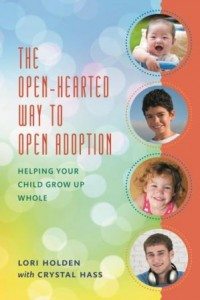 Lori Holden, mom of a teen son and a teen daughter, blogs from Denver. Her book, The Open-Hearted Way to Open Adoption: Helping Your Child Grow Up Whole, is available through your favorite online bookseller and makes a thoughtful anytime gift for the adoptive families in your life.
Lori Holden, mom of a teen son and a teen daughter, blogs from Denver. Her book, The Open-Hearted Way to Open Adoption: Helping Your Child Grow Up Whole, is available through your favorite online bookseller and makes a thoughtful anytime gift for the adoptive families in your life.

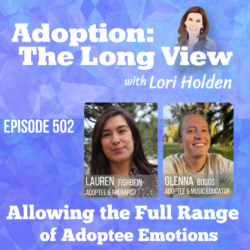
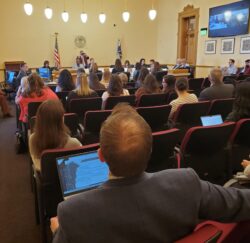
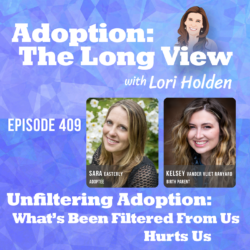

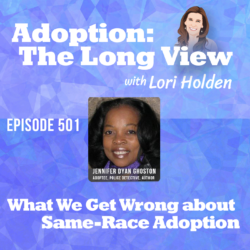

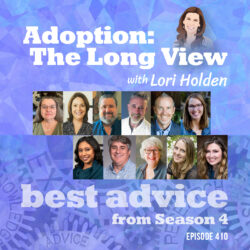
4 Responses
As always, another important post. Thank you for these continued messages of viewing this relationship as a relationship meant to benefit the adoptee, not a threat to the adoptive parents. Your words are helping me build a strong case for my nephew.
Thanks, Cristy. I hope your nephews parents are “open” to listening, lol.
Once again, I have been enlightened. It always surprises me to see parents who react about how things affect them, rather than how they might affect their child. Yet they probably think (or are kidding themselves) that they are putting their child first. Openness seems tailor-made to ensure that they are doing that.
So informative and helpful! I always love how you advocate for taking the adoption charge out of the relationship when thinking on boundaries, to put things into a healthy perspective. This was also great: “They did what you didn’t/couldn’t do, and you do what they couldn’t do. There is an evenness in this viewpoint.”